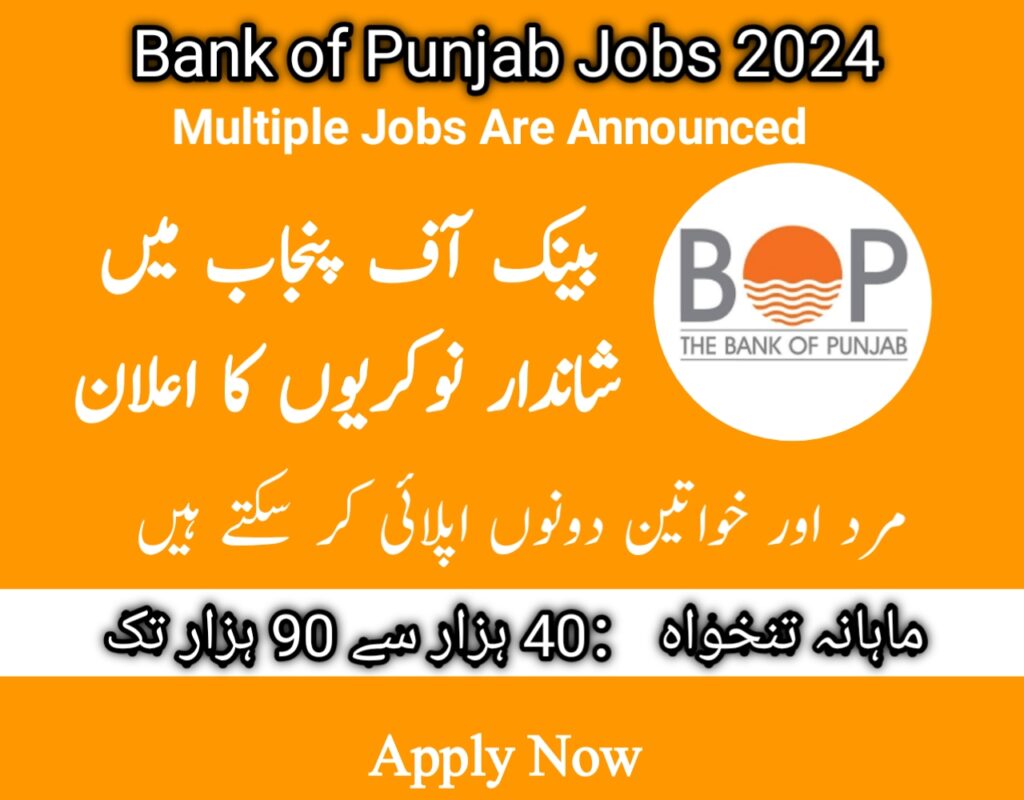Introduction:
Established in 1989, the Bank of Punjab (BOP) has emerged as a prominent financial institution in Pakistan, contributing significantly to the country’s banking sector and economic development. With a diverse range of products and services, BOP caters to the financial needs of individuals, businesses, and government entities. This essay delves into the history, functions, significance, challenges, and future prospects of the Bank of Punjab in Pakistan’s evolving financial landscape.
Historical Background and Evolution:
The Bank of Punjab traces its origins to the erstwhile Bank of Bahawalpur, which was established in 1943. In 1971, following the merger of Bahawalpur State into West Pakistan, the bank was renamed as the Bank of Bahawalpur. Later, in 1989, the institution was transformed into the Bank of Punjab under the Banks’ Nationalization Act. Since then, BOP has undergone significant expansion, diversification, and modernization to meet the evolving needs of its customers and the dynamic banking industry.
Functions and Services:
As one of the leading commercial banks in Pakistan, the Bank of Punjab offers a comprehensive array of financial products and services, including:
Retail banking:
BOP provides various retail banking services such as savings accounts, current accounts, fixed deposits, personal loans, credit cards, and debit cards to individual customers, catering to their diverse financial needs.
Corporate banking:
BOP offers a wide range of corporate banking solutions, including working capital financing, trade finance, project financing, syndicated loans, and treasury services to support the growth and expansion of businesses across sectors.
SME financing:
Recognizing the importance of small and medium-sized enterprises (SMEs) in Pakistan’s economy, BOP provides tailored financing solutions, advisory services, and capacity building initiatives to empower SMEs and promote entrepreneurship.
Agri financing:
Agriculture being a vital sector in Pakistan, BOP offers specialized agri financing products, such as crop loans, farm mechanization financing, livestock financing, and agri value chain financing, to support farmers and enhance agricultural productivity.
Digital banking:
BOP has embraced digital transformation by offering online banking, mobile banking, internet banking, and electronic payment services, enabling customers to conduct transactions conveniently and securely from anywhere, at any time.
Significance and Impact:
The Bank of Punjab plays a pivotal role in Pakistan’s financial sector and economy, contributing to:
Financial inclusion:
BOP’s extensive branch network, innovative products, and digital banking initiatives have expanded access to financial services, particularly in underserved rural and semi-urban areas, thus promoting financial inclusion and empowerment.
Economic development:
BOP’s financing support to various sectors, including agriculture, SMEs, and corporate entities, fosters economic growth, job creation, and poverty alleviation, contributing to Pakistan’s socio-economic development.
Infrastructure development:
BOP’s investments in infrastructure projects, such as energy, transportation, and telecommunications, facilitate infrastructure development, enhance connectivity, and stimulate investment in vital sectors of the economy.
Public sector partnerships:
BOP collaborates with government entities, development agencies, and international organizations to implement financial inclusion initiatives, infrastructure projects, and social welfare programs, aligning with national development priorities.
Challenges and Limitations:
Despite its achievements, the Bank of Punjab faces several challenges and limitations, including:
Competition:
The banking sector in Pakistan is highly competitive, with both domestic and international banks vying for market share. BOP must continually innovate and differentiate its products and services to stay competitive.
Risk management:
Managing credit risk, market risk, operational risk, and compliance risk is essential for BOP’s sustainability and resilience amidst a dynamic business environment and regulatory landscape.
Technological advancements:
Keeping pace with technological advancements and cybersecurity threats requires significant investments in IT infrastructure, digital capabilities, and cybersecurity measures to safeguard customer data and ensure service continuity.
Economic uncertainties:
Macroeconomic factors such as inflation, exchange rate fluctuations, political instability, and regulatory changes can impact BOP’s profitability, asset quality, and liquidity position, necessitating proactive risk mitigation strategies.
Future Prospects and Recommendations:
To address the aforementioned challenges and capitalize on future opportunities, the Bank of Punjab can consider the following strategies:
Digital innovation:
BOP should continue investing in digital technologies, fintech partnerships, and customer-centric innovations to enhance the efficiency, accessibility, and security of its banking services and foster a seamless digital banking experience for customers.
Risk management framework:
BOP should strengthen its risk management framework by adopting robust risk assessment methodologies, enhancing credit monitoring mechanisms, and promoting a culture of risk awareness and compliance throughout the organization.
Market expansion:
BOP should explore opportunities for market expansion, both geographically and in terms of product diversification, by tapping into new customer segments, enhancing cross-selling initiatives, and leveraging strategic partnerships to broaden its market reach.
Sustainable banking practices:
BOP should integrate environmental, social, and governance (ESG) considerations into its business operations, lending practices, and investment decisions to promote sustainability, responsible banking, and long-term value creation.
Conclusion:
The Bank of Punjab has emerged as a key player in Pakistan’s banking sector, contributing to financial inclusion, economic development, and infrastructure growth. By leveraging its strengths, embracing digital transformation, managing risks effectively, and fostering sustainable banking practices, BOP can continue to play a pivotal role in driving financial growth, empowering communities, and shaping Pakistan’s socio-economic landscape in the years to come.
